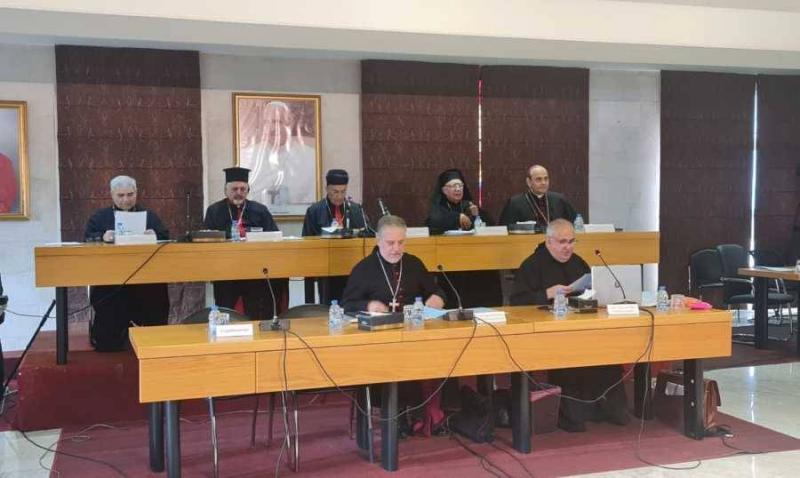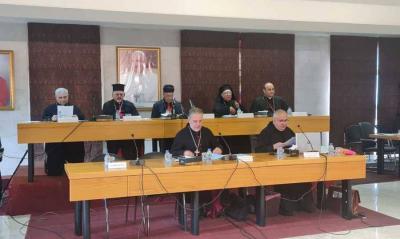The Council of Catholic Patriarchs and Bishops in Lebanon opened its fifty-fifth session at the patriarchal headquarters in Bkerke, under the presidency of Maronite Patriarch Cardinal Mar Bechara Boutros Al-Rahi, with participation from the Papal Ambassador Monsignor Paolo Borgia, Patriarch of the Greek Catholic Church Joseph I Absi, Patriarch of the Syrian Catholic Church Mar Ignatius Joseph III Younan, and representatives from the heads of other Catholic sects, in addition to a number of bishops and general superiors from various Catholic sects.
Following a joint prayer, Patriarch Al-Rahi delivered the opening speech, stating:
"We thank God for gathering us and illuminating us with the light of His Holy Spirit to commemorate the twenty-fifth anniversary of the issuance of the Apostolic Exhortation 'A New Hope for Lebanon,' which was signed in Beirut by Saint Pope John Paul II on May 10, 1997, during his pastoral visit to Lebanon.
I am pleased to welcome you all with a special greeting to His Excellency the new Papal Ambassador, Bishop Paolo Borgia, wishing him health and success in his mission, as well as to the new members:
His Excellency Bishop Selim Sfeir, Archbishop of the Maronite Archdiocese of Cyprus.
His Excellency Mar Isaac Joul George Boutros, the Patriarchal Assistant for Youth and Clergy Ministry of the Archdiocese of Beirut for the Syrian Catholics.
His Excellency Bishop George Iskandar, Metropolitan of Tyre for the Greek Catholics.
Father Hadi Mahfoud, the General Superior of the Lebanese Maronite Order.
Father Ramzi Greij, the Regional Superior of the Congregation of the Lazarist Fathers in the East.
Members of the office for the General Superiors and Regional Superiors of women's religious orders represented in the council:
Sister Nada Tanius, General Superior of the Basilian Order in Choueifat.
Sister Jean Dark Eid, official representative of the Sisters of Nazareth.
Sister Mourine Basil, General Deputy for the Rosary Convent in Lebanon.
We thank all those who completed their service in this council.
We are saddened to have bid farewell to four members of the council, all from our Maronite Church: the late bishops George Bou Joudeh, former Bishop of Tripoli (March 28, 2022), Tanios Khoury, former Bishop of Sidon (September 20, 2022), Paul Emile Saadeh, former Bishop of Batroun (September 21, 2022), and Paul Manjid Al-Hashim, Papal Ambassador and Apostolic Nuncio in the Gulf, and former Bishop of Baalbek and Deir El-Ahmar (October 7, 2022). We stand and recite the Our Father and the Peace for the repose of their souls.
On behalf of you all, I express our appreciation to the Secretary General, Father Claude Ndra, and his assistants in the General Secretariat of the council, to our brother Bishop Michel Aoun, head of the executive committee, and the other bishops who are members. We thank them for preparing this session, selecting its topic, and arranging its agenda. We also thank the speakers and facilitators in advance.
The points of our discussion revolve around the application of the Apostolic Exhortation after twenty-five years, focusing on national issues, coexistence, and memory purification as urgent needs within our Lebanese society. However, we must take an overall look at the reality of the Church after these twenty-five years. There is no doubt that every particular church has committed to applying many teachings from this Apostolic Exhortation. Our Maronite Church, for example, held a comprehensive synod between 2003 and 2006.
Our discussions will center on the concept of coexistence today at the following levels:
Managing diversity and harmonizing differences, purifying memory, dialogue and reconciliation, pathways for building peace, appropriate methods for educational memory purification, in addition to administrative tasks, and holding the General Assembly of Caritas Lebanon.
We find the content of this session's topic in chapters five and six of the Apostolic Exhortation. We can say that much less has been applied than should have been.
When Saint Pope John Paul II speaks of 'peace and reconciliation' after the trials of war, he calls on the Lebanese to 'a true purification of memories and consciences,' and therefore to 'foster a lasting peace built with patience and perseverance, for peace alone can be the true wellspring of development and justice' (paragraph 97).
The purification of memories and consciences is the condition without which there can be no open and constructive dialogue between Christians and Muslims on one side, and between political parties and parliamentary blocs on the other, in order to safeguard organized coexistence, which is outlined in the texts of the constitution, representing the national pact agreed upon by the Lebanese in 1943, and renewed by the Taif Agreement (1989), thus granting legitimacy to any political authority (see the introduction to the constitution). Through honest dialogue and genuine coexistence, the Lebanese can build their society (see the exhortation, paragraph 90).
However, if we look at our reality in Lebanon, we unfortunately find that those who made the war are still the ones ruling our country. This paralyzes the state due to smoldering disputes beneath the surface, and raises doubts in the external public opinion. Those who make war cannot make peace.
For this reason, these individuals have sadly been unable to purify their memories, and we witness and hear them hurling hurtful words across all forms of communication, on every occasion, as we see these days. For this reason, after six years of General Michel Aoun’s presidency, they have been unable or rather unwilling to elect a new president of the republic. Their significant achievement has been lowering the flag and closing the presidential palace, delivering a government that has been resigned for five months, with Lebanon in one of the most critical stages of its political, economic, financial, and social history.
The passage of twenty-five years since the issuance of the Apostolic Exhortation 'A New Hope for Lebanon' places us before a national duty that obliges our consciences to find effective means at all levels to guide our people and politicians in applying chapters five and six of the Apostolic Exhortation.
We ask God, through the intercession of Our Lady of Lebanon, Mary the Virgin, to guide us towards His glory and the revival of Lebanon and the welfare of all its citizens."
The closed council sessions will continue until next Friday, when the final statement will be issued, including all the matters discussed.




